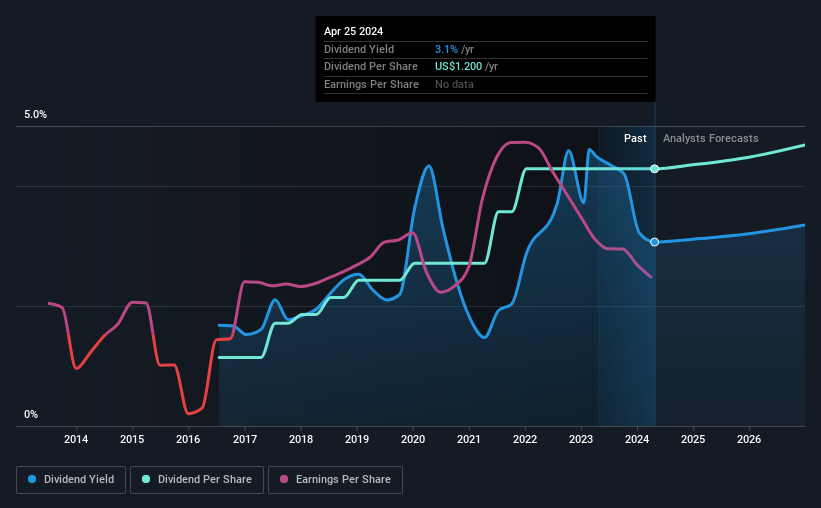Stock Analysis
- United States
- /
- Consumer Finance
- /
- NYSE:ALLY
Three Days Left Until Ally Financial Inc. (NYSE:ALLY) Trades Ex-Dividend

Some investors rely on dividends for growing their wealth, and if you're one of those dividend sleuths, you might be intrigued to know that Ally Financial Inc. (NYSE:ALLY) is about to go ex-dividend in just three days. Typically, the ex-dividend date is one business day before the record date which is the date on which a company determines the shareholders eligible to receive a dividend. The ex-dividend date is an important date to be aware of as any purchase of the stock made on or after this date might mean a late settlement that doesn't show on the record date. Accordingly, Ally Financial investors that purchase the stock on or after the 30th of April will not receive the dividend, which will be paid on the 15th of May.
The company's next dividend payment will be US$0.30 per share. Last year, in total, the company distributed US$1.20 to shareholders. Last year's total dividend payments show that Ally Financial has a trailing yield of 3.1% on the current share price of US$39.14. We love seeing companies pay a dividend, but it's also important to be sure that laying the golden eggs isn't going to kill our golden goose! We need to see whether the dividend is covered by earnings and if it's growing.
See our latest analysis for Ally Financial
Dividends are usually paid out of company profits, so if a company pays out more than it earned then its dividend is usually at greater risk of being cut. Fortunately Ally Financial's payout ratio is modest, at just 49% of profit.
Generally speaking, the lower a company's payout ratios, the more resilient its dividend usually is.
Click here to see the company's payout ratio, plus analyst estimates of its future dividends.

Have Earnings And Dividends Been Growing?
Businesses with shrinking earnings are tricky from a dividend perspective. If earnings decline and the company is forced to cut its dividend, investors could watch the value of their investment go up in smoke. So we're not too excited that Ally Financial's earnings are down 3.7% a year over the past five years.
Another key way to measure a company's dividend prospects is by measuring its historical rate of dividend growth. Ally Financial has delivered 18% dividend growth per year on average over the past eight years.
Final Takeaway
Should investors buy Ally Financial for the upcoming dividend? Earnings per share have shrunk noticeably in recent years, although we like that the company has a low payout ratio. This could suggest a cut to the dividend may not be a major risk in the near future. We're unconvinced on the company's merits, and think there might be better opportunities out there.
If you want to look further into Ally Financial, it's worth knowing the risks this business faces. For example - Ally Financial has 2 warning signs we think you should be aware of.
A common investing mistake is buying the first interesting stock you see. Here you can find a full list of high-yield dividend stocks.
Valuation is complex, but we're helping make it simple.
Find out whether Ally Financial is potentially over or undervalued by checking out our comprehensive analysis, which includes fair value estimates, risks and warnings, dividends, insider transactions and financial health.
View the Free AnalysisHave feedback on this article? Concerned about the content? Get in touch with us directly. Alternatively, email editorial-team (at) simplywallst.com.
This article by Simply Wall St is general in nature. We provide commentary based on historical data and analyst forecasts only using an unbiased methodology and our articles are not intended to be financial advice. It does not constitute a recommendation to buy or sell any stock, and does not take account of your objectives, or your financial situation. We aim to bring you long-term focused analysis driven by fundamental data. Note that our analysis may not factor in the latest price-sensitive company announcements or qualitative material. Simply Wall St has no position in any stocks mentioned.
About NYSE:ALLY
Ally Financial
Ally Financial Inc., a digital financial-services company, provides various digital financial products and services in the United States, Canada, and Bermuda.
Flawless balance sheet with reasonable growth potential.

